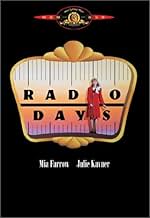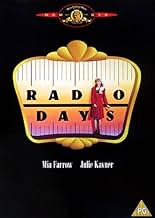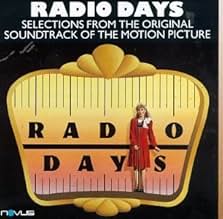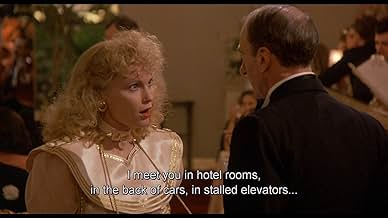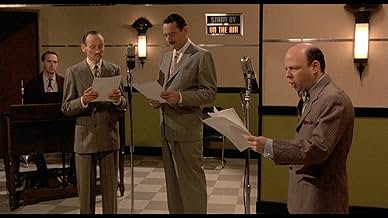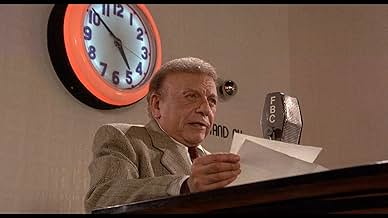Radio Days
- 1987
- Tous publics
- 1h 28min
NOTE IMDb
7,4/10
38 k
MA NOTE
Un regard nostalgique sur l'âge d'or de la radio axé sur une famille ordinaire et les différents interprètes de l'époque.Un regard nostalgique sur l'âge d'or de la radio axé sur une famille ordinaire et les différents interprètes de l'époque.Un regard nostalgique sur l'âge d'or de la radio axé sur une famille ordinaire et les différents interprètes de l'époque.
- Réalisation
- Scénario
- Casting principal
- Nommé pour 2 Oscars
- 3 victoires et 10 nominations au total
Mick Murray
- Avenger Crook
- (as Michael Murray)
Renée Lippin
- Ceil
- (as Renee Lippin)
Avis à la une
In my opinion, Radio Days is right up there with Annie Hall though it's different in that it's following several people's lives. Woody doesn't act in this, but his narration is excellent.
He takes the wonderful old songs and commercials from that time and weaves them into the story. I was completely captivated.
It's not a "laugh a minute" type film, but it also gets you thinking. Nevertheless, it has some hilarious scenes. Check out the Jewish fasting holiday scene. I've watched it at least 6 times and I still laugh. Also the scene with Mia Farrow's character was superb. One of my favorite lines is when she tells a top radio producer in her high-pitched nasal voice, "Jeez. We can't keep meeting like this. In the backs of cars, movie theaters and stalled elevators. You're gonna lose your respect for me!" I love this film.
He takes the wonderful old songs and commercials from that time and weaves them into the story. I was completely captivated.
It's not a "laugh a minute" type film, but it also gets you thinking. Nevertheless, it has some hilarious scenes. Check out the Jewish fasting holiday scene. I've watched it at least 6 times and I still laugh. Also the scene with Mia Farrow's character was superb. One of my favorite lines is when she tells a top radio producer in her high-pitched nasal voice, "Jeez. We can't keep meeting like this. In the backs of cars, movie theaters and stalled elevators. You're gonna lose your respect for me!" I love this film.
This movie starts with two burglars answering the phone during a break-in. They win the radio contest and the next day, the homeowners are shocked by the arrival of the winnings after finding their home robbed. Woody Allen narrates this nostalgic recollection of vignettes during his childhood. Joe (Seth Green) lives in Rockaway Beach with his parents Tess (Julie Kavner) and Martin (Michael Tucker) as well as an extended family. His imagination and his memories deliver stories about the people in his life and the radio they listen to. There is the War of the Worlds broadcast. Joe's favorite character is the Masked Avenger. There are also stories about the radio peronalities and aspiring actress cigarette-girl Sally White (Mia Farrow).
Woody delivers a loving tribute to the concept of radio through the eyes of childhood. This has a large cast with wide ranging vignettes. It's imaginative, touching, and fun. The characters are specific and compelling. There is a terrific veneer of memory. Through all the surreal and the real, there is the love of family and radio that transcends the screen onto the audience.
Woody delivers a loving tribute to the concept of radio through the eyes of childhood. This has a large cast with wide ranging vignettes. It's imaginative, touching, and fun. The characters are specific and compelling. There is a terrific veneer of memory. Through all the surreal and the real, there is the love of family and radio that transcends the screen onto the audience.
In preface, let me say that I was born at the tail-end of the "golden age of radio," but just in time to experience a touch of its magic and the hold it had on households night after night in that pre-TV era. Add to that a favorite aunt who had worked in radio for years on the West Coast and who regaled her nephew with story upon story, which in turn led to the years I later spent in radio (luckily, prior to the "formula radio" days). It all adds up to my absolutely having to go see "Radio Days" when it first came out, despite the fact that I'd never been the world's foremost Woody Allen fan. Too much of his work, for me, lacked that indefinable but oh so recognizable element of "heart."
Well, I was wrong about Woody. This film shows it.
Autobiographical -- or perhaps semi-autobiographical -- in nature, "Radio Days" evokes the time when people returned "to those thrilling days of yesteryear," and for whom, quite probably, it was equally thrilling to contemplate the magic of a box in their living room that could cause them to "watch" the stories unfold in their minds. "Remotes," or on-the-spot broadcasts transported them to the scene of unfolding tragedies or triumphs in a way that newspapers never could (and which TV, for all its advantages, rarely matches).
And yet the film, for all its authenticity in recreating studio practices (watch, for example, how the actors drop completed script pages onto the floorrather than turning them and risking a tell-tale rustle of paper), isn't really so much about radio itself as it is about the people who listened, as personified by one raucous, cantankerous and loving Brooklyn family. Beautifully evoked, particularly by Julie Kavner (Mother), Michael Tucker (Father), and the incomparable Dianne Wiest (as the perenially lovelorn Aunt Bea), it is their reactions to what they hear on the radio -- whether listening breathlessly to the war news (at a time when the end result was anything but certain) or Bea's abandonment in the middle of nowhere by a panicked suitor as Orson Welles' "War of the Worlds" broadcast takes hold -- that bring to life the era and the power of that medium.
Standouts? The whole cast is perfect, but for me, in addition to those previously mentioned, I have to cit Mia Farrow's portrayal of the dim-bulbed Sally White, who transforms herself with the aid of speech lessons into a radio personality. (For that matter, catch Danny Aiello as a less-than-brilliant hitman, particularly his scenes with Dina DeAngeles as his mom.)
Criticisms? One: At the end of a poignant scene in which young Joe has finally discovered what his dad does for a living, Allen insists on falling into some standby "schtick" in his voiceover. (I guess he couldn't resist; thankfully, it doesn't ruin the moment.)
Ultimately, of course, it is the era itself that this film celebrates. Faithfully, and lovingly, it is recreated with a skill that points up its absurdities at the same time it makes one hopefully nostalgic. And, if you're not very careful, you wind up falling hopelessly in love with this funny, obscure Brooklyn family.
And to the end of my days, I'll always wonder whether poor Aunt Bea ever did find her "Mr. Right" . . .
Well, I was wrong about Woody. This film shows it.
Autobiographical -- or perhaps semi-autobiographical -- in nature, "Radio Days" evokes the time when people returned "to those thrilling days of yesteryear," and for whom, quite probably, it was equally thrilling to contemplate the magic of a box in their living room that could cause them to "watch" the stories unfold in their minds. "Remotes," or on-the-spot broadcasts transported them to the scene of unfolding tragedies or triumphs in a way that newspapers never could (and which TV, for all its advantages, rarely matches).
And yet the film, for all its authenticity in recreating studio practices (watch, for example, how the actors drop completed script pages onto the floorrather than turning them and risking a tell-tale rustle of paper), isn't really so much about radio itself as it is about the people who listened, as personified by one raucous, cantankerous and loving Brooklyn family. Beautifully evoked, particularly by Julie Kavner (Mother), Michael Tucker (Father), and the incomparable Dianne Wiest (as the perenially lovelorn Aunt Bea), it is their reactions to what they hear on the radio -- whether listening breathlessly to the war news (at a time when the end result was anything but certain) or Bea's abandonment in the middle of nowhere by a panicked suitor as Orson Welles' "War of the Worlds" broadcast takes hold -- that bring to life the era and the power of that medium.
Standouts? The whole cast is perfect, but for me, in addition to those previously mentioned, I have to cit Mia Farrow's portrayal of the dim-bulbed Sally White, who transforms herself with the aid of speech lessons into a radio personality. (For that matter, catch Danny Aiello as a less-than-brilliant hitman, particularly his scenes with Dina DeAngeles as his mom.)
Criticisms? One: At the end of a poignant scene in which young Joe has finally discovered what his dad does for a living, Allen insists on falling into some standby "schtick" in his voiceover. (I guess he couldn't resist; thankfully, it doesn't ruin the moment.)
Ultimately, of course, it is the era itself that this film celebrates. Faithfully, and lovingly, it is recreated with a skill that points up its absurdities at the same time it makes one hopefully nostalgic. And, if you're not very careful, you wind up falling hopelessly in love with this funny, obscure Brooklyn family.
And to the end of my days, I'll always wonder whether poor Aunt Bea ever did find her "Mr. Right" . . .
This is a wonderful wonderful movie that exemplifies the phrase, "misty watercolored memories." It is a joy to watch and listen to. The era before and during WWII, however, was anything but wonderful. Radio Days presents a time when America was dealing with the Great Depression and its after effects and the horrible event that was World War II. Since the man narrating the memories was only a boy then, it is altogether fitting and proper that he see things as a child; for as he states in one scene, "our conversation turned from Nazis to more important things,like girls." No movies, except this one, that I recall, are able to deal with this critical age in American history without conveying the tragic time that it was.
I would like to think this family was really Woody Allen's, but it is probably a work of fiction, like his other pieces. But how tremendous that he can create (or remember) these people. As I watched it, one thought that kept recurring was that these were not "beautiful" manufactured people like we see in the media today; they had big hips and were fat and poor and... and none of that mattered. They were real. They were believable. You can't watch this movie without wondering what happened to them, did Aunt Bee find a husband? You cared about this family and personally, I wished they were mine.
The vignettes were sad and sweet. My favorite was poor departed Kirby Kyle; at least he had heart! And Leonard; and "donations for the promotion of a state in Palestine." So many memories that make us a part of a family most people never had. The viewer belongs to this warm and loving group.
Something has been lost with the concept of "nuclear family," with the lonely big houses and empty hours and unshared hopes and sorrows. Radio Days reminds us that having someone to experience life with is a treasure and a blessing, despite whacks on the head, martians, and fish, "That man always brings home fish!"
And oh, the music!
This is Woody Allen's masterpiece.
I would like to think this family was really Woody Allen's, but it is probably a work of fiction, like his other pieces. But how tremendous that he can create (or remember) these people. As I watched it, one thought that kept recurring was that these were not "beautiful" manufactured people like we see in the media today; they had big hips and were fat and poor and... and none of that mattered. They were real. They were believable. You can't watch this movie without wondering what happened to them, did Aunt Bee find a husband? You cared about this family and personally, I wished they were mine.
The vignettes were sad and sweet. My favorite was poor departed Kirby Kyle; at least he had heart! And Leonard; and "donations for the promotion of a state in Palestine." So many memories that make us a part of a family most people never had. The viewer belongs to this warm and loving group.
Something has been lost with the concept of "nuclear family," with the lonely big houses and empty hours and unshared hopes and sorrows. Radio Days reminds us that having someone to experience life with is a treasure and a blessing, despite whacks on the head, martians, and fish, "That man always brings home fish!"
And oh, the music!
This is Woody Allen's masterpiece.
10bbbaldie
This movie shouts one word: WARMTH. The colors, the plot, the characters, they are all wonderfully warm.
I've watched this movie with senior citizens who were around in the forties. I once watched it with a Jewish guy who grew up on Long Island (albeit in the early 30's, not the 40's). All comments were the same: THIS was life in New York during wartime.
Vietnam was my war, so this era was a mystery to me. However, any time a genius like Woody Allen can create a film that not only makes me and my rowdy friends laugh, but gets guffaws from my dear old Mom as well, it deserves a little fanfare.
I didn't even mention the solid gold music.
See this film at once!
I've watched this movie with senior citizens who were around in the forties. I once watched it with a Jewish guy who grew up on Long Island (albeit in the early 30's, not the 40's). All comments were the same: THIS was life in New York during wartime.
Vietnam was my war, so this era was a mystery to me. However, any time a genius like Woody Allen can create a film that not only makes me and my rowdy friends laugh, but gets guffaws from my dear old Mom as well, it deserves a little fanfare.
I didn't even mention the solid gold music.
See this film at once!
Le saviez-vous
- AnecdotesThe story of Kirby Kyle, the ill-fated baseball player, is a parody of former Chicago White Sox pitcher Monty Stratton, whose promising career was derailed after he lost part of his leg due to a hunting accident. Stratton attempted a comeback and then retired. His life was made into a movie: Un homme change son destin (1949).
- GaffesIn one scene, a pack of Camel cigarettes lies on a table, with a clearly visible bar code on the side of the package. The Universal Product Code would not be introduced until the 1970s.
- Citations
[Last lines]
Narrator: I never forgot that New Year's Eve when Aunt Bea awakened me to watch 1944 come in. I've never forgotten any of those people or any of the voices we would hear on the radio. Though the truth is, with the passing of each New Year's Eve, those voices do seem to grow dimmer and dimmer.
- Bandes originalesThe Flight of the Bumblebee
(1899-1900)
Music by Nikolai Rimsky-Korsakov
Performed by Harry James
Courtesy of CBS Records
Played during the opening credits
Meilleurs choix
Connectez-vous pour évaluer et suivre la liste de favoris afin de recevoir des recommandations personnalisées
Détails
- Date de sortie
- Pays d’origine
- Site officiel
- Langues
- Aussi connu sous le nom de
- Días de radio
- Lieux de tournage
- Radio City Music Hall - 1260 6th Avenue, Rockefeller Center, Manhattan, Ville de New York, New York, États-Unis(Joe, his Aunt Bea and her date see a movie there)
- Sociétés de production
- Voir plus de crédits d'entreprise sur IMDbPro
Box-office
- Budget
- 16 000 000 $US (estimé)
- Montant brut aux États-Unis et au Canada
- 14 792 779 $US
- Week-end de sortie aux États-Unis et au Canada
- 1 522 423 $US
- 1 févr. 1987
- Montant brut mondial
- 14 792 779 $US
Contribuer à cette page
Suggérer une modification ou ajouter du contenu manquant

Lacune principale
By what name was Radio Days (1987) officially released in India in English?
Répondre


